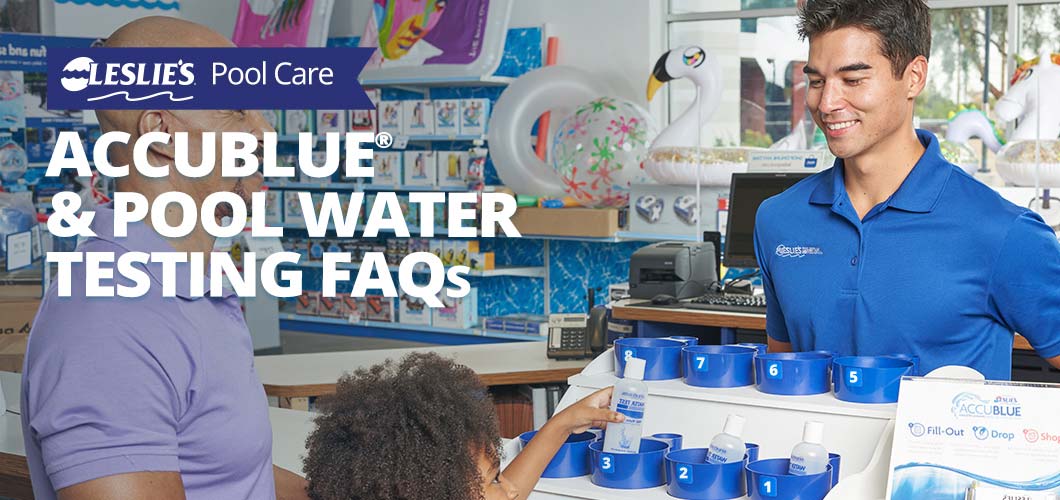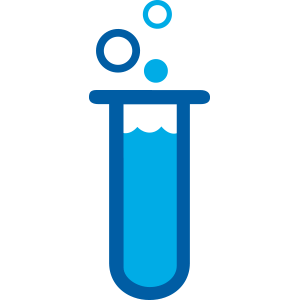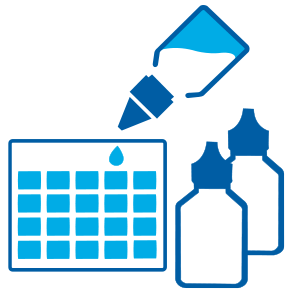
AccuBlue® & Pool Water Testing FAQs
Regularly testing your pool water is arguably one of the most important aspects of pool ownership. Without water tests, you can't maintain a properly balanced pool. And without balanced pool water, you'll soon have a pool that's not safe for swimming. Testing your water is pretty easy once you get the hang of it, but it can be confusing at first. In this post, we've accumulated some of the most common questions our pool experts answer related to pool water testing.
What is the purpose of testing pool water?
The primary reason pool owners should test their pool water is to ensure that it’s safe for swimming. Water testing checks sanitizer levels in the pool, and helps you know if extra sanitizer or shock treatments are needed. Regularly testing and balancing pool water also ensures your sanitizer will keep working efficiently. Unbalanced water decreases the effectiveness and longevity of pool sanitizers like chlorine, and limits its ability to fight off algae and germs, and prevent water-borne illnesses. In addition, poorly balanced water can be uncomfortable for swimming, and may damage pool surfaces and equipment over time.

What is the right way to collect a pool water sample?
When the pump has circulated the water for at least one hour, dip the sample bottle into the water about 12–18” (about elbow deep). Invert the bottle to collect your water sample, and bring it back to the surface. Make sure to collect the sample from a well-circulated area of the pool. Stagnant water can give you inaccurate test results.
How often should I test my pool water?
At the minimum, water should be tested at least once a week. But for many pools, twice weekly testing is needed. If the pool is used often, daily temperatures are high, or if there’s been a weather event that’s left your pool a mess, you may even have to test more often. It's always best to test frequently and make small adjustments as the need arises. If you test less often, you may end up with a yo-yo effect as you attempt to make bigger adjustments all at once.
At the minimum, routine weekly testing should include results for sanitizer levels (chlorine, bromine, or biguanide), pH, and Total Alkalinity, which can fluctuate quickly. Other water balance factors, such as Cyanuric Acid, Calcium Hardness, Total Dissolved Solids, phosphates, metals, and salt (if you have a saltwater pool) will not shift as rapidly. Test for these at least once per month to keep an eye on the levels.
DIY TIP: Most of our customers use a simple at-home water test as part of their weekly maintenance routine. Then they'll bring a water sample to their local Leslie's store for a free comprehensive AccuBlue® test once a month. With the professional help of a Leslie's pool expert, you can quickly address small water balance issues before they become a big problem in your pool.
What is the difference between test kits and test strips?
Test strips are one of the easiest methods of testing pool water at home. Simply dip the strip in your pool water sample to start. Then, follow instructions to match the color on the strip with the color on the label. Test strips usually only look at a few aspects of water chemistry, including Total Available Chlorine, Free Available Chlorine, pH, and Total Alkalinity.

Test kits, on the other hand, use dropper-style titration testing to measure water chemistry. These tests can be a little more complicated to use. However, they may offer a higher level of accuracy than test strips can provide.
There are also a couple models of digital water testers available for at-home use, which provide results for basic water chemistry. These are often more costly than other types of water tests, but can provide fast results with close accuracy.
What's better — testing my pool water at home or testing in store?
At-home water tests are extremely helpful and convenient for the day-to-day maintenance of your pool’s basic needs. However, both test strips and test kits leave plenty of room for error. Leslie’s free in-store AccuBlue® water test gives you the most accurate results available. AccuBlue® precisely measures 10 different aspects of your pool’s water chemistry, which is more than can be said for most at-home water testing products or other in-store water tests. We recommend having your water professionally tested in-store at least once per month to supplement your weekly at-home tests and keep your pool water on track.
How long does it take to get my results if I have my pool water tested at Leslie's?
With Leslie’s AccuBlue®, you’ll have a complete analysis of your pool’s water chemistry before you leave the store — results are ready in 60 seconds. Once results are in, you'll receive a printed copy of your results to take home. You can also access test results in the Leslie's Pool App, which is available for both Android and iPhone mobile devices.
BONUS TIP: It's easy to track both in-store and at-home water test history in the Leslie's App. Watch trends over time, and use that information to guide your pool maintenance routine.
What's makes Leslie’s AccuBlue® unique?
Leslie’s AccuBlue® uses industry-leading proprietary technology to provide the most accurate water chemistry analysis available. After your water sample is added to the testing disk, you're only 60 seconds away from comprehensive water test results. As reactions happen within the disk, different wavelengths of light pass through the sample to precisely measure your pool's water chemistry. Just one test with Leslie’s AccuBlue® can reveal complete results for Total Chlorine/Bromine, Free Chlorine/Bromine, pH, Total Alkalinity, Calcium Hardness, Cyanuric Acid, metals (copper and iron), phosphates, and more. Our in-store experts test for Total Dissolved Solids and Salt Levels (for salt system pools) separately with a TDS/salt meter, and these results are included in your AccuBlue® 10-point water analysis and treatment plan. This is far more than you can get with most other water tests.
Once the test is complete, you'll receive an automated analysis that includes a water health score. If any aspects of your water chemistry are off, you'll receive customized recommendations to resolve the issue. One of our highly trained pool experts will guide you through your results and provide you with easy-to-follow solutions tailored to your pool's specific needs.
Should I test my pool water after hosting a party?
Absolutely. High bather loads can throw off water balance and place a strain on available sanitizer levels in the pool. It’s not a bad idea to shock or oxidize the pool during the evening hours after your guests leave. Doing so will help keep your pool crystal clear and prevent cloudy water the day after your party.
I have a saltwater pool. Is there anything I need to do differently to test my water?

The main difference is that you’ll need to occasionally check salt levels in your pool. Some saltwater chlorine generators come with an onboard system that detects saline concentrations in the pool. Even so, it’s still a good idea to routinely test salt levels to confirm an accurate reading. You can test on your own with a specialized saltwater test strip, test kit, or electronic tester. Or, instead of buying a specific test, you can just bring a water sample to your local Leslie’s store for a free test.
Salt levels don’t fluctuate as quickly as other aspects of pool chemistry, so you won't need to test salinity every single week. If there’s a lot of splash-out happening in your pool, or if you're currently dealing with a pool leak, you may want to test more frequently. It's important to keep the salt concentration within range so your chlorine generator can work efficiently.
Does testing my pool water prevent it from getting cloudy?
Testing itself will not prevent cloudy water. However, testing can point out water imbalance issues that often contribute to cloudy pool water problems, and will provide direction in resolving the root cause. To learn more, check out our popular blog post, How to Clear Cloudy Pool Water.
Does testing my water help prevent algae in my pool?
Again, testing is helpful in pointing out water imbalances that may encourage algae growth, and allows you to take corrective action. To prevent algae, ensure Free Available Chlorine, pH, Total Alkalinity, and other water balance factors are within proper ranges. To keep the risk of algae to a minimum, phosphate levels should be kept as close to zero as possible. If needed, you can add a Phosphate Remover and/or an Algaecide to further protect the pool. Learn more on our blog, Top 10 Pool Algae Prevention Tips.
How much of each pool chemical will I need in order to properly balance my water?

As with all pool chemicals, it’s important to read and follow all label instructions when dosing and applying chemicals to your pool. Most chemical labels list the product quantities needed to achieve the desired effect. Dosage recommendations are usually based on a pool size of 10,000 gallons. If your pool is larger or smaller, a bit of simple math will help you determine the proper dosage for your pool. If you need help, the pool experts at your local Leslie’s store can assist. When you bring in a water sample for a free AccuBlue® water test, you’ll receive a customized printout of the results, including instructions and doses for treatment according to your pool size.
How do I administer chemicals to a pool?
First of all, determine which chemicals you need by referencing the results of your water test. For example, if pH is low, you'll need a pH increaser to bring the levels up. Always add pool chemicals while the pool pump is running. Attempting to balance pool water that’s not circulating may result in damage to pool surfaces, including scaling and discoloration.
Some chemicals can be added directly to the pool water, while others should be dissolved or diluted before being introduced to the pool. Some chemicals require extra safety measures during handling, including eye and skin protection. We've said it before, but we'll say it again — always read and follow label instructions and safety precautions before adding any chemicals to the pool.
DIY TIP: If you’re diluting chemicals before adding them to the pool, remember this important rule of thumb — always add chemicals to water, never add water to chemicals! Doing so can be hazardous to your health and safety. Refer to the product label for more detailed instructions, including the water to chemical ratio for dilution.
It’s important to balance your pool in the correct order, and avoid adding incompatible chemicals at the same time. Always start by balancing Total Alkalinity and pH first, then adjust Calcium Hardness if needed. Follow up with Cyanuric Acid and Chlorine, and then you can worry about the remaining aspects of your water chemistry.
Not finding the answer to your question? Let us know! Stop by your local Leslie's today to have all of your water chemistry questions answered. Don't forget to bring a water sample with you, so our knowledgeable associates can walk through your free AccuBlue water test results with you.